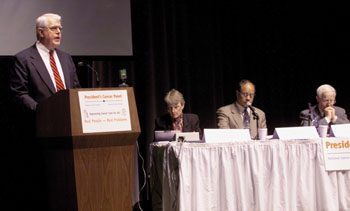
Dr. Clifton Meador, executive director of the Meharry-Vanderbilt Alliance, described the innovative initiative to the President's Cancer Panel. The panel included, from left, Maureen Wilson, Ph.D., Dr. Harold P. Freeman, and Dr. Paul Calabresi. (photo by Dana Johnson)
Help for at-risk doctors
Physicians are under extreme pressure. Patient demands, family issues, and other stressors can sometimes feel overwhelming. Many doctors successfully balance the demands of the high stress lifestyle. Others do not.
Alcohol and drug abuse, anxiety, depression, stress management and other concerns have plagued physicians for years. Many times, doctors will try to treat themselves with alcohol or self-prescribed narcotics.
The Center for Professional Health was formed at Vanderbilt to help physicians with these and other problems.
The center was formed in 1997 as a new educational, research, and prevention resource to address matters of professional health, with an emphasis on the proper prescribing of controlled drugs by physicians.
Dr. Anderson Spickard Jr. was appointed director of the center in that same year. Spickard, an internist for 40 years, serves on numerous national boards and advisory groups on matters relating to addiction and substance abuse. He is the founding director of the Vanderbilt Institute on Treatment of Addiction (VITA) and has treated thousands for substance abuse problems.
In late 1998 and early 1999, a rash of doctor suicides, deaths, and other tragedies prompted officials at Vanderbilt to explore preventive measures to help curb future problems. The Vanderbilt Physician Wellness Services was formed and Spickard was named chair of the Physician Wellness Committee.
The program is designed to provide counseling, education and training services to address physician needs through the Employee Assistance Program and the Center for Professional Health.
Vanderbilt Physician Wellness Services offers specialized courses, workshops, seminars, counseling, and support groups for physicians, residents, and fellows.
The program objectives are prevention, early identification, assessment referral and possible treatment, and re-entry assistance for troubled physicians.
“The key is to get help early,” Spickard emphasized. “Physicians tend to deny they have a problem. They believe the myth of invulnerability. “Unsupervised self medication with highly addictive drugs is a special hazard.”
In addition to the proper prescribing of controlled drugs, the program offers courses on proper sexual boundaries and ways to recognize impairment.
Physician Wellness support groups include: Peer Support, a group of volunteer physicians who helps peers return to work after treatment in the Employee Assistance Program; Women Physician Group, organized to serve the unique needs of women physicians; and Risk Management Support Groups, group discussion in facilitated sessions to help physicians and spouses handle the stress of malpractice suits.
For years, alcohol abuse has been perceived as the prevalent difficulty for physicians. While alcohol abuse is critical, there are other issues just as damaging.
“Physician Wellness is not just about alcoholism,” said training director Bill Swiggart. “We are much broader than that.”
“Anger and stress management is one of our biggest efforts,” Spickard added. “We are trying to reduce the hours residents work and the fatigue factor.”
Spickard and Employee Assistance Program director Mary Yarbrough urge everyone to take advantage of the services. With 750 faculty physicians and 640 residents, the need for counseling and support at Vanderbilt is tremendous.
“We are hoping that through education and training, individuals will feel comfortable in seeking help early in a confidential setting,” Spickard said.
“We are creating an institutional wellness culture,” Spickard commented. “We need to know how to position ourselves so physicians can have a full life.”
Vanderbilt is ahead of other institutions in providing these services to physicians. By Jan. 1, 2001, all hospitals will be required to have a wellness committee in place.
“By reading the regulations, we are way ahead of the curve in compliance,” Spickard said.
Members of Vanderbilt’s Physician Wellness Committee are: Drs. Anderson Spickard Jr., Charles Beattie, George Bolian, Deborah German, Doyle Graham, Cynthia Turner-Graham, Cornelia Graves, Kirk Haun, Fred Kirchner Jr., Peter Martin, Paul Miles, Seenu Reddy, and Mary Yarbrough; Jeanette Norden, Ph.D.; and Sandra Bledsoe, R.N., ARM.
For more information about the programs offered by The Center for Professional Health call 936-0678. The office is located at 1107 Oxford House.
Additional services offered at Vanderbilt include the EAP Physician Health Program. Headed by Dr. Paul Ragan, the program is the entry point for physicians with emotional or behavioral problems.
According to Yarbrough, the program supports physicians in seeking treatment for behavioral, emotional, financial, substance abuse, or marital problems that have, or potentially will impact job performance or the workplace environment.
The Employee Assistance Program is located at 10 Medical Arts Building. The telephone number is 936-1327.














